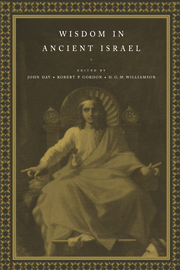Book contents
- Frontmatter
- Contents
- List of abbreviations
- Introduction
- Part 1 The ancient near eastern setting
- Part 2 Old Testament and Apocryphal texts
- 4 Foreign Semitic influence on the wisdom of Israel and its appropriation in the book of Proverbs
- 5 The limits of theodicy as a theme of the book of Job
- 6 Qoheleth
- 7 A house divided: wisdom in Old Testament narrative traditions
- 8 Wisdom in Solomonic historiography
- 9 Amos and wisdom
- 10 Hosea and the wisdom tradition: dependence and independence
- 11 Isaiah and the wise
- 12 Jeremiah and the wise
- 13 The wisdom psalms
- 14 Wisdom and Daniel
- 15 Ecclesiasticus: a tract for the times
- 16 The Christian use and the Jewish origins of the Wisdom of Solomon
- Part 3 Themes
- Biographical note: John Adney Emerton
- Bibliography of the works of John Adney Emerton
- Indexes
- Principal biblical and apocryphal references
10 - Hosea and the wisdom tradition: dependence and independence
Published online by Cambridge University Press: 16 October 2009
- Frontmatter
- Contents
- List of abbreviations
- Introduction
- Part 1 The ancient near eastern setting
- Part 2 Old Testament and Apocryphal texts
- 4 Foreign Semitic influence on the wisdom of Israel and its appropriation in the book of Proverbs
- 5 The limits of theodicy as a theme of the book of Job
- 6 Qoheleth
- 7 A house divided: wisdom in Old Testament narrative traditions
- 8 Wisdom in Solomonic historiography
- 9 Amos and wisdom
- 10 Hosea and the wisdom tradition: dependence and independence
- 11 Isaiah and the wise
- 12 Jeremiah and the wise
- 13 The wisdom psalms
- 14 Wisdom and Daniel
- 15 Ecclesiasticus: a tract for the times
- 16 The Christian use and the Jewish origins of the Wisdom of Solomon
- Part 3 Themes
- Biographical note: John Adney Emerton
- Bibliography of the works of John Adney Emerton
- Indexes
- Principal biblical and apocryphal references
Summary
It has long been supposed that the epilogue or last verse of the book of Hosea (xiv 10 [9]), replete with the language of the wisdom literature, was added later to Hosea's collected prophecies (‘Whosoever is wise, let him understand these matters’) in order to suggest to the reader the lesson that should be drawn from them. More recently, a number of scholars have drawn attention to the judicious choice of words in the didactic propositions which answer the (implied) catechetical question at the beginning of the verse. The proposition that ‘the ways of Yahweh are straight and just men walk in them, while transgressors stumble on them’ contains both the vocabulary and the antithetic structure which typifies the wisdom tradition. Yet the writer seems to have picked up particular words from the text of Hosea's prophecies: thus, ‘stumble’ (iv 5, v 5, xiv 2) and ‘transgress’ (vii 13, viii 1); even wisdom and understanding, which characterize the opening formula (‘Whosoever is wise, let him understand these matters, whoever discriminating, let him take note of them’), form part of Hosea's own lexical stock (e.g. xiii 13, iv 14). Accordingly, what is clearly contrived in xiv 10 (9) is nonetheless carefully and sensitively contrived; its thought is essentially continuous with the material which it seeks to elucidate.
Recognition of the clear continuity between the epilogue, indubitably cast in the mould of a wisdom saying, and elements in the actual prophecies of Hosea raises the questions to what extent the prophet knew of the traditions of (early) wisdom, and what use he may have made of them.
- Type
- Chapter
- Information
- Wisdom in Ancient Israel , pp. 124 - 132Publisher: Cambridge University PressPrint publication year: 1995
- 1
- Cited by



